- Page 2:
INTERNATIONAL SERIES OF MONOGRAPHS
- Page 6:
Quantum Gravity Second Edition CLAU
- Page 10:
PREFACE TO THE SECOND EDITION The c
- Page 14:
PREFACE The unification of quantum
- Page 18:
CONTENTS 1 Why quantum gravity? 1 1
- Page 22:
CONTENTS xi 7.4.3 Quantization 226
- Page 26:
1 WHY QUANTUM GRAVITY? 1.1 Quantum
- Page 30:
QUANTUM THEORY AND THE GRAVITATIONA
- Page 34:
QUANTUM THEORY AND THE GRAVITATIONA
- Page 38:
QUANTUM THEORY AND THE GRAVITATIONA
- Page 42:
QUANTUM THEORY AND THE GRAVITATIONA
- Page 46:
QUANTUM THEORY AND THE GRAVITATIONA
- Page 50:
QUANTUM THEORY AND THE GRAVITATIONA
- Page 54:
PROBLEMS OF A FUNDAMENTALLY SEMICLA
- Page 58:
PROBLEMS OF A FUNDAMENTALLY SEMICLA
- Page 62:
PROBLEMS OF A FUNDAMENTALLY SEMICLA
- Page 66:
PROBLEMS OF A FUNDAMENTALLY SEMICLA
- Page 70:
APPROACHES TO QUANTUM GRAVITY 23 is
- Page 74:
2 COVARIANT APPROACHES TO QUANTUM G
- Page 78:
THE CONCEPT OF A GRAVITON 27 two in
- Page 82:
THE CONCEPT OF A GRAVITON 29 Exploi
- Page 86:
THE CONCEPT OF A GRAVITON 31 of the
- Page 90:
THE CONCEPT OF A GRAVITON 33 only t
- Page 94:
THE CONCEPT OF A GRAVITON 35 ¬ Þ
- Page 98:
THE CONCEPT OF A GRAVITON 37 where
- Page 102:
PATH-INTEGRAL QUANTIZATION 39 state
- Page 106:
PATH-INTEGRAL QUANTIZATION 41 canon
- Page 110:
PATH-INTEGRAL QUANTIZATION 43 inter
- Page 114:
PATH-INTEGRAL QUANTIZATION 45 quant
- Page 118:
PATH-INTEGRAL QUANTIZATION 47 R 3 a
- Page 122:
PATH-INTEGRAL QUANTIZATION 49 Perfo
- Page 126:
PATH-INTEGRAL QUANTIZATION 51 £
- Page 130:
PATH-INTEGRAL QUANTIZATION 53 Ven (
- Page 134:
PATH-INTEGRAL QUANTIZATION 55 forma
- Page 138:
PATH-INTEGRAL QUANTIZATION 57 Unfor
- Page 142:
PATH-INTEGRAL QUANTIZATION 59 F =
- Page 146:
PATH-INTEGRAL QUANTIZATION 61 and c
- Page 150:
PATH-INTEGRAL QUANTIZATION 63 first
- Page 154:
PATH-INTEGRAL QUANTIZATION 65 is ob
- Page 158:
PATH-INTEGRAL QUANTIZATION 67 t+1 t
- Page 162:
PATH-INTEGRAL QUANTIZATION 69 For t
- Page 166:
QUANTUM SUPERGRAVITY 71 quantum fie
- Page 170:
3 PARAMETRIZED AND RELATIONAL SYSTE
- Page 174:
PARTICLE SYSTEMS 75 can be set to z
- Page 178:
and are compatible with the time ev
- Page 182:
where here PARTICLE SYSTEMS 79 H S
- Page 186:
THE FREE BOSONIC STRING 81 render t
- Page 190:
THE FREE BOSONIC STRING 83 and Ĥ 1
- Page 194:
THE FREE BOSONIC STRING 85 In the s
- Page 198:
PARAMETRIZED FIELD THEORIES 87 with
- Page 202:
PARAMETRIZED FIELD THEORIES 89 Ü
- Page 206:
PARAMETRIZED FIELD THEORIES 91 spac
- Page 210:
RELATIONAL DYNAMICAL SYSTEMS 93 X x
- Page 214:
RELATIONAL DYNAMICAL SYSTEMS 95 whe
- Page 218:
RELATIONAL DYNAMICAL SYSTEMS 97 Thi
- Page 222:
THE SEVENTH ROUTE TO GEOMETRODYNAMI
- Page 226:
THE SEVENTH ROUTE TO GEOMETRODYNAMI
- Page 230:
THE SEVENTH ROUTE TO GEOMETRODYNAMI
- Page 234:
THE 3+1 DECOMPOSITION OF GENERAL RE
- Page 238:
THE 3+1 DECOMPOSITION OF GENERAL RE
- Page 242:
THE 3+1 DECOMPOSITION OF GENERAL RE
- Page 246:
THE 3+1 DECOMPOSITION OF GENERAL RE
- Page 250:
THE 3+1 DECOMPOSITION OF GENERAL RE
- Page 254:
THE 3+1 DECOMPOSITION OF GENERAL RE
- Page 258:
THE 3+1 DECOMPOSITION OF GENERAL RE
- Page 262:
THE 3+1 DECOMPOSITION OF GENERAL RE
- Page 266:
THE 3+1 DECOMPOSITION OF GENERAL RE
- Page 270:
THE 3+1 DECOMPOSITION OF GENERAL RE
- Page 274:
CANONICAL GRAVITY WITH CONNECTIONS
- Page 278:
CANONICAL GRAVITY WITH CONNECTIONS
- Page 282:
CANONICAL GRAVITY WITH CONNECTIONS
- Page 286:
CANONICAL GRAVITY WITH CONNECTIONS
- Page 290:
5 QUANTUM GEOMETRODYNAMICS 5.1 The
- Page 294:
THE PROGRAMME OF CANONICAL QUANTIZA
- Page 298:
THE PROBLEM OF TIME 137 parameter (
- Page 302:
THE PROBLEM OF TIME 139 One can der
- Page 306:
THE PROBLEM OF TIME 141 The main pr
- Page 310:
THE PROBLEM OF TIME 143 ∫ ∏ 〈
- Page 314:
THE GEOMETRODYNAMICAL WAVE FUNCTION
- Page 318:
THE GEOMETRODYNAMICAL WAVE FUNCTION
- Page 322:
THE GEOMETRODYNAMICAL WAVE FUNCTION
- Page 326:
THE GEOMETRODYNAMICAL WAVE FUNCTION
- Page 330:
THE GEOMETRODYNAMICAL WAVE FUNCTION
- Page 334:
THE GEOMETRODYNAMICAL WAVE FUNCTION
- Page 338:
THE GEOMETRODYNAMICAL WAVE FUNCTION
- Page 342:
THE GEOMETRODYNAMICAL WAVE FUNCTION
- Page 346:
THE GEOMETRODYNAMICAL WAVE FUNCTION
- Page 350:
THE GEOMETRODYNAMICAL WAVE FUNCTION
- Page 354:
THE SEMICLASSICAL APPROXIMATION 165
- Page 358:
THE SEMICLASSICAL APPROXIMATION 167
- Page 362:
THE SEMICLASSICAL APPROXIMATION 169
- Page 366:
THE SEMICLASSICAL APPROXIMATION 171
- Page 370:
THE SEMICLASSICAL APPROXIMATION 173
- Page 374:
THE SEMICLASSICAL APPROXIMATION 175
- Page 378:
THE SEMICLASSICAL APPROXIMATION 177
- Page 382:
THE SEMICLASSICAL APPROXIMATION 179
- Page 386:
6 QUANTUM GRAVITY WITH CONNECTIONS
- Page 390:
CONNECTION AND LOOP VARIABLES 183 h
- Page 394:
CONNECTION AND LOOP VARIABLES 185
- Page 398:
CONNECTION AND LOOP VARIABLES 187
- Page 402:
QUANTIZATION OF AREA 189 S and S
- Page 406:
∫ Ê i [S]U[A, α] =−8πβi QUA
- Page 410:
QUANTIZATION OF AREA 193 (and highe
- Page 414:
QUANTUM HAMILTONIAN CONSTRAINT 195
- Page 418:
Furthermore, one can show that QUAN
- Page 422:
7 QUANTIZATION OF BLACK HOLES 7.1 B
- Page 426:
BLACK-HOLE THERMODYNAMICS AND HAWKI
- Page 430:
BLACK-HOLE THERMODYNAMICS AND HAWKI
- Page 434:
BLACK-HOLE THERMODYNAMICS AND HAWKI
- Page 438:
BLACK-HOLE THERMODYNAMICS AND HAWKI
- Page 442:
CANONICAL QUANTIZATION OF THE SCHWA
- Page 446:
CANONICAL QUANTIZATION OF THE SCHWA
- Page 450:
CANONICAL QUANTIZATION OF THE SCHWA
- Page 454:
CANONICAL QUANTIZATION OF THE SCHWA
- Page 458:
BLACK-HOLE SPECTROSCOPY AND ENTROPY
- Page 462:
BLACK-HOLE SPECTROSCOPY AND ENTROPY
- Page 466:
QUANTUM THEORY OF COLLAPSING DUST S
- Page 470:
QUANTUM THEORY OF COLLAPSING DUST S
- Page 474:
QUANTUM THEORY OF COLLAPSING DUST S
- Page 478:
QUANTUM THEORY OF COLLAPSING DUST S
- Page 482:
THE LEMAîTRE-TOLMAN-BONDI MODEL 22
- Page 486:
THE LEMAîTRE-TOLMAN-BONDI MODEL 23
- Page 490:
THE LEMAîTRE-TOLMAN-BONDI MODEL 23
- Page 494:
THE LEMAîTRE-TOLMAN-BONDI MODEL 23
- Page 498:
THE INFORMATION-LOSS PROBLEM 237 bl
- Page 502:
PRIMORDIAL BLACK HOLES 239 time of
- Page 506:
PRIMORDIAL BLACK HOLES 241 Table 7.
- Page 510:
8 QUANTUM COSMOLOGY 8.1 Minisupersp
- Page 514:
MINISUPERSPACE MODELS 245 The usual
- Page 518:
MINISUPERSPACE MODELS 247 Integrati
- Page 522:
MINISUPERSPACE MODELS 249 term whic
- Page 526:
MINISUPERSPACE MODELS 251 boundary
- Page 530:
MINISUPERSPACE MODELS 253 ( ) ∂ 2
- Page 534:
MINISUPERSPACE MODELS 255 Ψ=A(a,
- Page 538:
MINISUPERSPACE MODELS 257 flat (for
- Page 542:
INTRODUCTION OF INHOMOGENEITIES 259
- Page 546: INTRODUCTION OF INHOMOGENEITIES 261
- Page 550: BOUNDARY CONDITIONS 263 as artifici
- Page 554: BOUNDARY CONDITIONS 265 decided by
- Page 558: BOUNDARY CONDITIONS 267 a’’ 000
- Page 562: BOUNDARY CONDITIONS 269 does ‘out
- Page 566: BOUNDARY CONDITIONS 271 Information
- Page 570: LOOP QUANTUM COSMOLOGY 273 construc
- Page 574: LOOP QUANTUM COSMOLOGY 275 obeying
- Page 578: LOOP QUANTUM COSMOLOGY 277 (V µ+5
- Page 582: 9 STRING THEORY 9.1 General introdu
- Page 586: GENERAL INTRODUCTION 281 The quanti
- Page 590: GENERAL INTRODUCTION 283 as the usu
- Page 594: QUANTUM-GRAVITATIONAL ASPECTS 285 m
- Page 600: 288 STRING THEORY divergences of qu
- Page 604: 290 STRING THEORY We have already e
- Page 608: 292 STRING THEORY √ X µ R (σ−
- Page 612: 294 STRING THEORY (and beyond) for
- Page 616: 296 STRING THEORY details. We start
- Page 620: 298 STRING THEORY There exist two d
- Page 624: 300 STRING THEORY hole can form if
- Page 628: 302 STRING THEORY the metric is fla
- Page 632: 304 STRING THEORY account. We shall
- Page 636: 306 STRING THEORY holographic princ
- Page 640: 308 INTERPRETATION 10.1.1 Decoheren
- Page 644: 310 INTERPRETATION the quantum enta
- Page 648:
312 INTERPRETATION The time t that
- Page 652:
314 INTERPRETATION D(t|φ, φ ′ )
- Page 656:
316 INTERPRETATION For a massive mi
- Page 660:
318 INTERPRETATION which are dynami
- Page 664:
320 INTERPRETATION Although most of
- Page 668:
322 INTERPRETATION the existence of
- Page 672:
324 INTERPRETATION classical turnin
- Page 676:
326 INTERPRETATION quantum-gravitat
- Page 680:
328 REFERENCES Ashtekar, A. and Lew
- Page 684:
330 REFERENCES Barvinsky, A. O., Ka
- Page 688:
332 REFERENCES Bojowald, M. (2001b)
- Page 692:
334 REFERENCES Csordás, A. and Gra
- Page 696:
336 REFERENCES pp. 458-73. Birkhäu
- Page 700:
338 REFERENCES Giulini, D. (2003).
- Page 704:
340 REFERENCES Hawking, S. W. (1976
- Page 708:
342 REFERENCES Iwasaki, Y. (1971).
- Page 712:
344 REFERENCES http://www.livingrev
- Page 716:
346 REFERENCES Loll, R., Westra, W.
- Page 720:
348 REFERENCES Núñez, D., Quevedo
- Page 724:
350 REFERENCES Rosenfeld, L. (1963)
- Page 728:
352 REFERENCES Teitelboim, C. (1980
- Page 732:
354 REFERENCES Press, Cambridge. We
- Page 736:
This page intentionally left blank
- Page 740:
358 INDEX reduced, 309 deparametriz
- Page 744:
360 INDEX experimental tests, 325 i


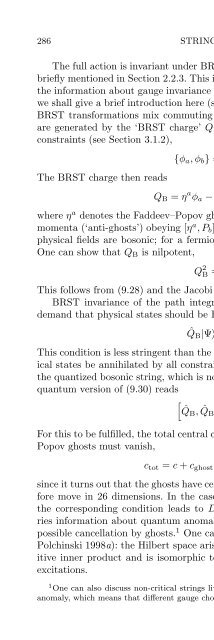
![arXiv:1001.0993v1 [hep-ph] 6 Jan 2010](https://img.yumpu.com/51282177/1/190x245/arxiv10010993v1-hep-ph-6-jan-2010.jpg?quality=85)
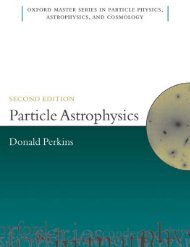
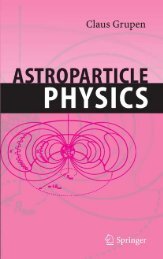
![arXiv:1008.3907v2 [astro-ph.CO] 1 Nov 2011](https://img.yumpu.com/48909562/1/190x245/arxiv10083907v2-astro-phco-1-nov-2011.jpg?quality=85)
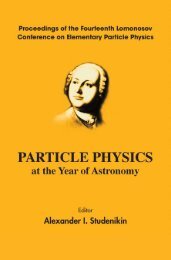
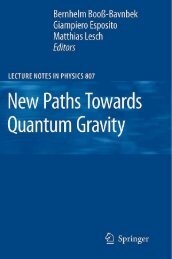
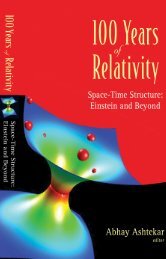
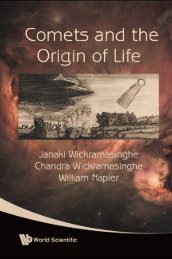
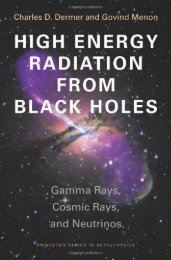
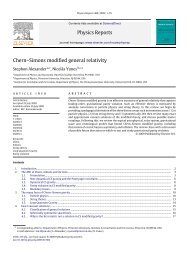
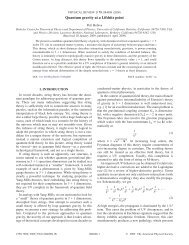
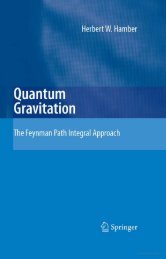
![arXiv:1002.4928v1 [gr-qc] 26 Feb 2010](https://img.yumpu.com/41209516/1/190x245/arxiv10024928v1-gr-qc-26-feb-2010.jpg?quality=85)
![arXiv:1206.2653v1 [astro-ph.CO] 12 Jun 2012](https://img.yumpu.com/39510078/1/190x245/arxiv12062653v1-astro-phco-12-jun-2012.jpg?quality=85)